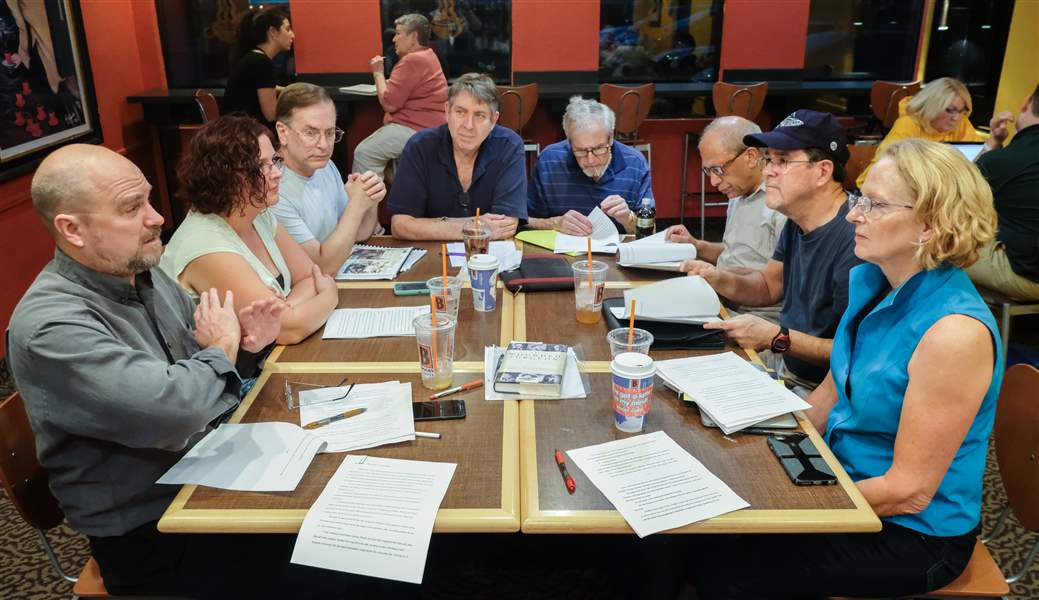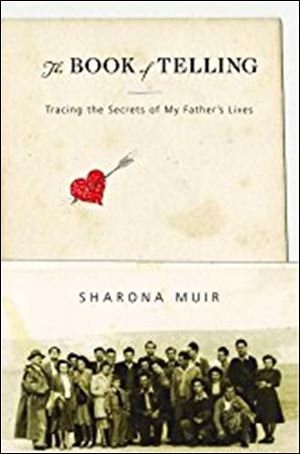
Local memoirists share experiences
Wide range of local residents tell their stories
10/8/2017
From left Chris Kwapich, Sarah Charles, James C. Mack, Chris Cummings, Don Slessman, Mohan Pandey, Bob Beach, and Mary Bush Shipko of The Toledo Writers Workshop discuss a writing sample at Biggby Coffee in Sylvania.
The Blade/Jeremy Wadsworth
Buy This Image
When recently retired grant writer Karen Glaser sat down to try her hand at creative writing, she knew she had a story to tell. It would incorporate political upheaval, police violence, even a death threat from a band of left-wing guerrilla-inspired radicals.
“I knew it was there,” she said. “I knew it was dramatic.”
The trick was to tell it in such a way that her readers would find it equally as dramatic. And as Ms. Glaser, 75, continues to revise and revise again her tentatively titled work, The Reluctant Revolutionary, she’s quick to admit that’s a tough hurdle to clear.

From left Chris Kwapich, Sarah Charles, James C. Mack, Chris Cummings, Don Slessman, Mohan Pandey, Bob Beach, and Mary Bush Shipko of The Toledo Writers Workshop discuss a writing sample at Biggby Coffee in Sylvania.
Of course she thinks it’s compelling: It happened to her.
Ms. Glaser is one of numerous area memoirists who mine personal experience to share stories with wide-reaching appeal. It’s a genre that demands introspection — a dry chronology of events won’t do — and one that presents itself as a creative vehicle for storytellers who range from celebrities and politicians to retired grant writers in Blissfield, Mich.
“I think we do ourselves a disservice by thinking that only the lives of the famous or celebrated are worth reading about,” said Professor Lawrence Coates, who chairs the English department at Bowling Green State University. “I think everybody has at least one book in them.”
There are a slew of reasons a person would embark on the often soul-searching journey of memoir writing. For some — like Ms. Glaser and Mary Bush Shipko, each of whom trades critiques and words of encouragement with fellow fiction and nonfiction writers through the Toledo Writers Workshop, which meets weekly at a Biggby Coffee in Sylvania — it feels important to share a first-person account of a significant period in history.
Ms. Glaser wants her readers to know what it meant to be a revolutionary in the 1960s and ’70s, when she immersed herself in the anti-war movement and, for a time, lived as a “flower child” in a California commune. Ms. Bush Shipko, 68, of Sylvania, shares her experience breaking a gender barrier in Aviatrix, a memoir she self-published in 2015.
Ms. Bush Shipko relates her experiences as the first female pilot hired to fly for Hughes Airwest in 1976, and, in Aviatrix, in part describes a working environment difficult to imagine since the passage of subsequent civil rights acts.
Mike Hackney, 48, another writer with whom Ms. Glaser and Ms. Bush Shipko trade passages at the Toledo Writers Workshop, recognized a cathartic effecton his struggles with bipolar disorder in crafting free-verse poems.
He published The Downturn through Chipmunka Publishing in 2012.

'The Book of Telling: Tracing the Secrets of My Father's Lives,' by Sharona Muir
“It helps you to make sense out of your life, to put things in words and look back and understand them,” Mr. Hackney said. “For me, it’s a form of therapy almost. It has a therapeutic value to it.”
Or perhaps there’s a more universal motivation for memoirs. Professor Coates, for his part, turned to the Greek philosopher Plato.
“The unexamined life is not worth living,” he quoted. “There’s something in our human character that wants to understand who we are and where we come from.”
Professor Sharona Muir, also of Bowling Green, published a memoir, The Book of Telling: Tracing the Secrets of My Father’s Lives, through Random House in 2005. She said the years or research, writing, and reflection that went into it ultimately enabled her to understand her father, who had passed away well before its publication, in a new and more profound way.
The book explores both her own experiences and those of her father, an immigrant and freelance inventor who, she learned after his death, had created Israel’s first rocket as part of a little-known group of Israeli inventors tasked with bolstering the country’s weaponry during its war of independence.
Professor Muir sought to learn more about his past during a trip to Israel in 1995, made possible by a faculty research grant, and described feeling keenly a sense of pressure to record this aspect of her father’s story.
Memoir, after all, she said, is a “contribution to the collective memory.”
But perhaps more important to her memoir than the historical account, she said, is a “big human truth” that she relates in the work. By speaking with her father’s colleagues, and by learning about his life and work within the context of his past as a Holocaust survivor, she came to understand him and his freelance inventions in a new light.
“These people did not talk about the past, did not think about it, because their past was blown up,” she said of her father and his colleagues in Israel, who had similarly survived the Holocaust. “The only place to go was the future. You not only invented things. You also invented yourselves.”
Local memoirists explore a wide range of experiences in their works. James Mock, 63, of Maumee, is using his experience navigating a sailboat from New York to Virginia in 2011 as a narrative vehicle to share other anecdotes from his life on and off the water. Ready About is in its first draft, and Mr. Mock plans to self-publish.
Mohan C. Pandey, 72, of Sylvania, is drawing inspiration from his life as a retired Indian diplomat in his work, and Don Slessman, 75, also of Sylvania, puts to paper personal stories that his Parkinson’s disease makes difficult to share in spoken conversation.
The objectivity that fellow writers can offer on such personal works is often beneficial, as several writers through the Toledo Writers Workshop have found. Ms. Glaser, for example, is working on incorporating more reflection in her work based on the suggestion she’s received.
Ms. Glaser admitted that her initial drafts focused heavily on what happened to her, perhaps most dramatically a turning-point moment at the 1968 Democratic Convention in Chicago. Ms. Glaser went in support of the anti-war candidate Eugene McCarthy, and, although she was surrounded by what she thought of as a “modest” group of clergy, professors, and the like, she nonetheless found herself swept up into a violent clash between protesters and police.
The experience “totally radicalized” her, she said.
“I was a teacher,” she said. “I couldn’t go back to teaching. All I could think of was ending the war.”
Her memoir continues to detail her involvement in the anti-war movement, including, notably, concern for a boss in California who was targeted for death by the Symbionese Liberation Army.
Professor Muir, who is developing a curriculum for a class on memoir writing at Bowling Green, said she recommends that prospective writers connect with a creative writing course early in the process. She also recommends they heed the little voice inside them.
“If you feel like you have a story to tell, you should do that,” she said. “Take that urge seriously. Nobody is too unimportant to write a memoir.”
For more information on the Toledo Writers Workshop, go to toledowriters.com.
Contact Nicki Gorny at ngorny@theblade.com or 419-724-6133.